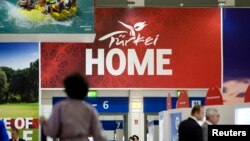A U.S. trading partner and NATO ally says it is concerned by the recent U.S. Senate vote to block “fast track” authority, which would have been a key step toward successfully negotiating trade agreements with Pacific and European nations.
Speaking on condition they not be identified, Turkish officials said that when a procedural vote Tuesday went against trade promotion authority, or TPA, it “added suspense” to their hopes of greatly expanding trade with the United States. TPA would facilitate a pending European trade deal with the U.S. Supporters said the TPA legislation was likely to be amended and resubmitted for approval.
Baffling Trade Talks Explained
Trade Promotion Authority, or TPA, is supposed to give Congress a chance to give instructions to U.S. negotiators, who then work, often for years, to hammer out the best possible deal with other nations that trade with the United States. Under TPA, Congress retains the responsibility to approve or reject a signed deal, but cannot amend the agreement.
Trans Pacific Partnership, or TPP, is a proposed deal among 12 Pacific nations, including the United States. Trade officials say this agreement is nearing completion, but some difficult issues remain. Trade deal supporters say having TPA in place would make it easier to get a deal done between the United States and hard-bargaining trading partners.
Transatlantic Trade and Investment Partnership, or TTIP, is a proposed deal between the United States and the European Union. These talks are said to be at a relatively early stage.
Trade Adjustment Assistance, or TAA, is a program intended to help workers displaced by foreign trade get the training they need to find new jobs.
Washington and the European Union are in the early stages of negotiating the Transatlantic Trade and Investment Partnership, or TTIP. Turkey is part of a customs union with other European nations but is not a member of the EU, nor is it a part of the TTIP negotiations.
Turkish officials worry that because of the customs union, a TTIP deal that does not include Ankara would allow U.S. goods to enter the Turkish economy at a low tariff, while not giving the same kind of help to Turkish goods headed for the U.S. market.
The Turks said that if they were not included in TTIP, they would "adapt” and seek other ways to boost trade, such as a free-trade agreement. Officials said Turkey has favored free trade for decades and sees it as a way to boost growth for both partners. Officials also said Turkey's economy nearly tripled in size between 2003 and 2014.
Turkish officials said the current $19 billion trade volume with the United States was “peanuts” compared witih their $400 billion overall trade and a smalll fraction of their trade with the European Union.
The U.S. is the world's largest economy, while Turkey ranks 17th globally and sixth in Europe.
Analysts at the Standard & Poor’s rating agency said Turkey’s economy has been helped by falling oil prices but faces problems from political uncertainty as the nation heads into elections in June. S&P said the economy is growing at about a 3 percent annual pace this year and probably will speed up a bit next year.










